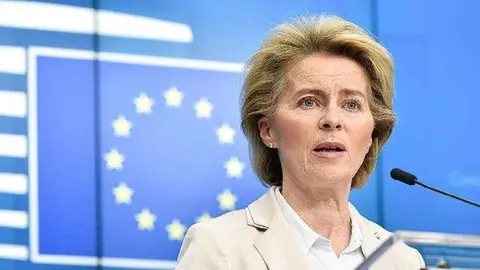Von der Leyen promotes EU in Mexico

The President of the European Commission (EC) brings to a close an important visit for the European Union (EU) after feeling in situ the temperature of relations at government level with Brazil, Argentina, Chile and Mexico.
In the Aztec country, Von der Leyen reiterated that Mexico is a strategic partner, a key member of the G20 with which the EU shares a series of values.
"We are going to strengthen our economic ties and deepen cooperation on environmental issues, on energy and ecological transition and on social issues and migration," the European leader stressed in her meeting with President Andrés Manuel López Obrador.
The European Union is Mexico's third largest trading partner, while Mexico is the EU's fourteenth largest trading partner. Trade and investment flows have tripled since the entry into force of the current agreement.
Like most countries in the world, the global pandemic affected trade flows between Mexico and the EU, which amounted to 51.1 billion euros in 2020 and decreased by 17.6% year-on-year. Mexico attracted €6.6 billion of Foreign Direct Investment (FDI) in 2020. And in terms of a cumulative amount of investment, the historical figure, from 1999 to 2021, totalling €177.3 billion.
With Mexico, the EU has been modernising its trade agreement since 2016, but it has not been able to reach a successful conclusion, despite the fact that on 21 April 2018 the EU and Mexico reached an agreement in principle "on a modernised trade pillar" of the Economic Partnership, Political Coordination and Cooperation Agreement between the EU and Mexico, also known as the Global Agreement, which has been in force since 2000.
It is assumed that, during the Presidency of the European Council, which will be held by Spain in the second half of the year, both issues will be discussed, both the fate of the Mercosur-EU agreement and the modernised EU-Mexico agreement. And, moreover, with the intention of unblocking them.
In case it is apples or pears, what will take place in Brussels on 17 and 18 July will be the Third Summit of the Community of Latin American and Caribbean States and the EU. Brussels wants to return to the era of constant summits and exchanges of ideas and proposals; although, if it wants to seduce the leaders in office, it will have to open its pockets by promising generous investments in the region.
Von der Leyen has crossed the pond in search of reliable partners because the EU will require 10 million tonnes of green hydrogen per year to offset its decarbonisation process, and has not gone so far as to look for "partners" in Brazil, which is the tenth largest economy in the world, or in Mexico, which is the fifteenth.
On the subject
It is China's unusual advance in the region with its investments and its overwhelming commercial capacity that now worries von der Leyen. It is not for nothing that in her 2022 State of the Union address she repeatedly insisted on calling for unity among all EU partners to create a strategy and invest in 'the power of democracies' and build a like-minded bloc.
There are more ideological and political (than economic or commercial) interests, although Brussels is aware of the needs for funding, resources and investment in the region and has prepared its Global Gateway strategy for this purpose.
What is the Global Gateway? It is the EU's response to China's huge project with its New Silk Road (One Road, One Belt), which aims to link the entire world to the Asian giant.
Through the Global Gateway, in force since 2021, the EU has a fund of up to 300 million euros to support investments that meet the objectives of the UN's 2030 Agenda and the Sustainable Development Goals and the Paris Agreement. Although the fund accumulates some 10 billion euros available.
Brussels explains to me that they need "a trusted partner" to design sustainable and quality projects and ensure that projects are implemented in a transparent manner.
This investment plan is guided by six basic principles: 1) democratic values and high standards; 2) good governance and transparency; 3) equal partnerships; 4) green and clean projects; 5) a focus on security; and, 6) a focus on stimulating the private sector.
Has the EU been too late in the face of China's onslaught in the region? China is helped by the fact that it does not have a colonialist past with Latin Americans and, ultimately, the anti-COVID vaccine diplomacy applied by both Beijing and Moscow has been a door opener to reconnect with several Latin American governments.
This region saw the US first vaccinate its people with first generation mRNA vials from Pfizer and Astrazeneca whose per capita costs exceeded the budgetary expectations of many Latin American countries' coffers. Cheap Chinese and Russian vaccines served to revitalise ties with Latin American nations. Von der Leyen wants to reconnect alliances in a region that has veered towards a left that sometimes pulls into the gully and the EU is increasingly tinged by conservative governments with the far-right gaining seats. A difficult relationship...


